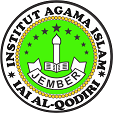Publication Ethics
Publishing Ethics Guidelines
Publishing articles in Lisan An Nathiq Journal is an important building block in the development of a coherent and respected knowledge network. This is a direct reflection of the quality of the work of the authors and institutions that support them. The articles reviewed support and contain scientific methods. Therefore, it is important to approve the standards of ethical behavior that are expected for all parties involved in the publication, namely: writers, journal editors, best partners, publishers, and the public.
Center for Research and Community Service (LP3M) IAI Al Qodiri Jember as the publisher of Lisan An Nathiq Journal is responsible for guarding all stages of publishing seriously and recognizing ethical. Responsibilities and other responsibilities. In addition to being committed to ensuring that reprint advertisements and other commercial income have no impact or influence on editorial decisions, the institution is also committed to assisting communication with journal managers or other publishers if deemed useful and necessary.
Publishing Decision
Lisan An Nathiq: Journal of Arabic Language and Education Editor is responsible for deciding which of the articles submitted must be published. Validation of the work and its importance for researchers and readers must always encourage that decision. Editors can be guided by journal editorial policy and limited by legal provisions as must be upheld regarding defamation, copyright infringement, and plagiarism. Editors can negotiate with other editors or the assessment team in making this decision.
Fair Treatment
Editors always assess manuscripts based on their intellectual content regardless of race, gender, sexual orientation, religious beliefs, ethnic origin, nationality or political philosophy of the authors.
Confidentiality
Editors and editing staff may not disclose any information about the text submitted to someone other than the author, expert editor, best partner, and publisher.
Notification and Conflict of Interest
Unpublished materials revealed in the submitted text may not be used in the editor's own research without the clear written consent of the author.
Contributions to Editorial
Decisions The best partner assessment helps editors in making editorial decisions and through editorial communication with the author can also help the author improve his writing.
Speed
Each selected assessor who feels that he or she is not qualified to assess the research reported in a text or knows that his quick review will not be able to tell the editor and free himself from the assessment process.
Confidentiality
Every text received for assessment must be treated as a confidential document. The document may not be shown or discussed with others unless authorized by the editor.
Objectivity Standards
Assessment must be done objectively. Personal criticism of the author is not justified. Assessors must express their views clearly with supporting arguments.
Source Recognition
The Valuer must identify relevant published works that are not quoted by the author. Every statement that an observation, derivation, or argument has been previously reported must be accompanied by a relevant quote. An assessor must also ask the editor to pay attention to the similarity or overlap between the assessed text and other published articles.
Notification and Conflict
The Interest Information or confidential opinions obtained through the best partner's assessment must be kept confidential and may not be used for personal gain. Assessors may not weigh manuscripts where they have a conflict of interest originating from a relationship or connection that is competitive, collaborative, or otherwise with any writer, company, or institution related to writing.

.jpg)









